It’s an unfortunate fact that our bodies are on “toxic overload” today.
We’re being bombarded with toxins from the cosmetic and personal care products we feed our bodies via our skin, from the food we feed our bodies via our mouths, and from the very air we breathe.
Even for those in peak health it’s a problem, because the human body may not be equipped to handle the volume of toxins it is facing today.
And chances are high the very clothes you wear day and night are a significant part of the problem.
In large part, that’s because “typical” laundry products can be loaded with chemicals that may harm health in a variety of ways.
Of course, you wouldn’t know this from watching advertisements for those laundry products. Those ads want to sway you into equating their products with clean, fresh-smelling clothing — they don’t want to draw any attention to what may be hiding in their formulas.
Therefore, I’ll draw your attention to that important knowledge here, along with what to look for to choose better options.
Why Laundry Products Are a Problem
More and more people are becoming aware of just how many toxins are hiding out in their homes, but laundry detergent is one product that often gets overlooked.
Furthermore, some companies are “greenwashing” consumers — which essentially means fooling them — by using phrases on their labels that sound health-conscious. When you turn the product around and read the ingredient label, however, they can be anything but health-conscious.
Also, much of the attention surrounding toxic laundry products has focused on dryer sheets. There’s good reason for this, since they may be toxic to your skin and lungs. But don’t let that draw attention away from what you use to wash your clothing — detergent.
In brief, one obvious reason you want to avoid potentially toxic laundry detergent is because your clothes contact your skin all day, and for many people, all night, too (as do the sheets and other bedding you wash). The chemicals in detergents are not magically all washed away in the rinse cycle — many can and do remain in the clothing. And make no mistake, your skin is a prominent doorway into your body, meaning you can literally be consuming many of the chemicals where they may be absorbed into your bloodstream.
Furthermore, even while you are washing clothes using these typical detergents, the chemicals can off-gas into the air you breathe and land on surfaces, etc.
Who Is Most at Risk?
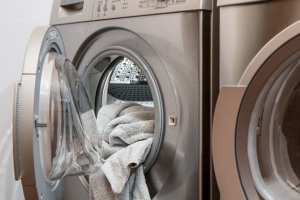
It should be clear that anyone who wears clothing (which includes everyone, or nearly everyone!) may be at risk for health problems from toxic laundry detergent.
However, those who usually suffer the most from immediate effects are children, the elderly, and anyone with sensitive skin. These groups tend to have more reactive skin and lower immune function, which makes them particularly vulnerable to any type of chemical.
Another frequently overlooked group is pets.
Dogs, cats, and other animals are often in contact with bedding that has been washed, blankets, the clothing of the people around them, etc. (They also breathe the air inside homes where the chemicals can off-gas, and they move about and rest on surfaces where the chemicals can reside.)
In short, it’s possible that unexplained allergies in your pets could come from laundry products — just like they can for humans.
These may be the most at-risk groups.
BUT it’s important to keep in mind that the toxins in laundry detergent may cause harm to anyone.
And, again, considering how we are bombarded with toxins from seemingly “every angle” today — and considering that, like switching your cosmetics to safer choices, this is a relatively easy fix — it just makes sense for everyone to consider making healthier choices in this area!
Top Toxins to Avoid in Laundry Detergent
Fragrance
Synthetic fragrances are in countless household products and represent some of the worst chemicals you can be exposed to. Unfortunately, they are very common in laundry products, including detergent.
Fragrance chemicals frequently cause allergic reactions. Symptoms may include rashes, respiratory issues, and even migraines and sinus problems. Some fragrance chemicals are also suspected or known carcinogens and endocrine disruptors.
Companies are not required to disclose fragrance ingredients, but the word “fragrance,” “parfum,” or a similar term does have to appear on the label. You can usually tell a detergent contains fragrance even without reading the label because scent terms are part of the marketing game (think words like “fresh,” “clean,” or “breeze”).
However, do be aware that even products labeled “unscented” may still contain fragrance to mask the scent of other chemicals. Always read the label to be sure.
Sodium Lauryl Sulfate (SLS)
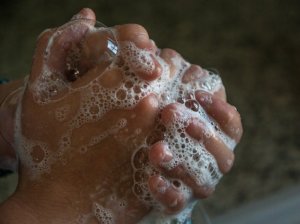
Sodium lauryl sulfate (SLS) is a commonly used chemical in laundry detergent. It’s classified as a surfactant, which means it helps remove dirt and other debris from clothing. It also adds foaming action to detergents, soaps, etc.
The problem with SLS is that it may cause skin, eye, and lung irritation. There’s also indication that it may be toxic to the environment, particularly aquatic life.
Be aware that SLS can be naturally derived, so you may find it even in “green” detergents. Also, lookout for a closely related chemical- sodium laureth sulfate (SLES). It has similar dangers and is often contaminated with other toxic chemicals (more on that next)
1,4 Dioxane
1,4 dioxane is a nasty chemical that you definitely don’t want in your home. It’s classified by the EPA as a likely human carcinogen and can also cause skin, lung, kidney, and liver issues. It easily penetrates the skin and is even suspected of causing birth defects.
An added problem with 1,4 dioxane is that you’ll never see it on the label. This chemical is a contaminant that is produced during a manufacturing process known as ethoxylation. Sodium laureth sulfate (SLES) is frequently ethoxylated and contaminated with 1,4 dioxane (yet another reason to avoid this ingredient).
USDA Certified Organic standards do not allow ethoxylation, so choosing organic products is the best way to avoid 1,4 dioxane.
Benzene
Benzene ingredients go by a few names, including benzyl acetate and dichlorobenzene. The warnings for benzyl acetate include skin irritation, respiratory distress, and effects on the kidneys. Dichlorobenzene is also an irritant, very toxic to aquatic life, and known to cause cancer.
Another downside is that benzene is a petroleum derivative- something you really don’t want in contact with your skin.
Formaldehyde
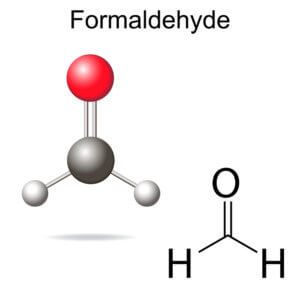
Formaldehyde is known to be a dangerous chemical, carcinogen, and skin irritant. Yet, you’d be surprised to learn how many common household products it’s in — including many laundry detergents.
Some companies do still add formaldehyde to their products, but it is most often hidden (meaning you won’t see it on the label).
Quaternium-15 is a common preservative that releases small amounts of formaldehyde over time. Other preservatives, like DMDM hydantoin and any with “urea” in the name, can also release formaldehyde.
Fragrance is another hiding spot for formaldehyde. It can be added in small amounts to fragrance formulas (and manufacturers don’t have to disclose it), or it can be produced when certain fragrance chemicals react with ozone.
Nonylphenol Ethoxylates (NPEs)
Besides being tricky to pronounce, nonylphenol ethoxylates (NPEs) are another toxic group of chemicals often found in laundry detergent. They are considered endocrine disruptors and also breakdown into an even more problematic chemical: nonylphenol (NP).
NP is known to accumulate in the environment and has been found in human breast milk. It’s very toxic to aquatic wildlife and has shown reproductive and developmental effects in lab studies.
Some companies have voluntarily phased out NPES, but they aren’t officially banned, so you still need to be on the lookout.
Bleach
Bleach has become practically a staple laundry product. There’s no doubt that it can get white clothing whiter, but it’s also a very harsh chemical with toxic effects.
Acute exposure to bleach can cause severe caustic burns, blindness, fluid in the lungs, and respiratory failure. In fact, chlorine bleach is considered a hazardous chemical in its original state.
Even less significant exposure has been linked to health problems. For example, some research indicates that “passive exposure” to bleach is linked to higher rates of respiratory illness and infection in children. Using it to do laundry can also release toxic volatile organic compounds (VOCs) that are harmful to breathe in.
Optical Brighteners
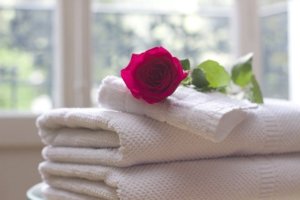
Have you ever wondered how laundry detergents make your clothes look whiter, brighter, and stainless?
One secret is optical brighteners — also known as optical brightening agents (OBAs) or UV brighteners.
Surprisingly, these chemicals don’t actually whiten or brighten clothing at all. What they really do is coat your clothing with a substance that absorbs UV and violet light rays and reemits them in the blue region of the electromagnetic spectrum.
This technical explanation for how optical brighteners work translates to one basic thing: They trick your eyes into thinking clothes are whiter and brighter — without doing a thing to truly remove stains.
Unfortunately, besides creating an optical illusion, optical brighteners may cause skin irritation and “long-lasting harmful effects to aquatic life.” They are basically chemicals with no useful effect that can potentially harm your health.
Ammonium Sulfates and Other Surfactants
We’ve already discussed the problematic surfactants SLS and SLES, but there are more to watch out for. Ammonium laureth sulfate (ALES) and ammonium lauryl sulfate (ALS) are two examples of synthetic, petroleum-based surfactants.
Of course, we don’t want to consume petroleum products by mouth, and so, because the skin consumes, too, it makes sense to keep petroleum products away from skin.
But ALES can also cause eye and skin irritation and may be contaminated with 1,4 dioxane (the suspected carcinogen).
Polyethylene glycol (PEG) is another petroleum-based chemical that’s commonly used as a surfactant and in a range of other products. It’s yet another substance that can be contaminated with 1,4 dioxane and can also trigger anaphylaxis.
Quats
Quats is short for quaternary ammonium compounds — chemicals frequently added to cleaning products for their disinfectant properties. They can also be used as surfactants, which is why they are found in certain laundry detergents.
As potentially toxic chemicals, quats can cause eye and skin irritation and may trigger allergies or respiratory problems. They also may play a role in skin sensitivity, which can develop over time as your skin is consistently exposed to chemicals.
Some organizations are calling for quaternary ammonium products to especially be discontinued around children. This is because they have been found to “disrupt important cellular pathways,” which can have a big effect on small, developing bodies.
Artificial Dyes

It may seem strange that dyes are added to some laundry detergents. After all, detergents are meant to clean clothing, so why would synthetic colors be added?
There’s really no great answer to this question, but adding dye is unfortunately a common practice. Sometimes, it’s just done to make the product look more appealing. Other companies may add a small amount of blue tint to their detergent to make clothes look brighter after washing (somewhat similar to optical brighteners).
As with fragrance, dyes may not be good news for sensitive skin. They can cause irritation and allergic reactions and don’t even get your clothes clean in the process!
There are other potentially serious potential dangers of food dyes, including a link to ADHD, tumor growth, asthma, and behavioral changes. There are likely similar downsides to dyes in household products, including detergent.
Choosing a Better Detergent: What to Look For
Plant-Based
To avoid petroleum-based chemicals and synthetic ingredients, choosing plant-based alternatives is important. Unfortunately, it will require some work on your part because you can’t believe everything companies advertise.
There isn’t a strict definition of “plant-based,” so you’ll need to do some label-reading to make sure the ingredients in a specific detergent are really natural. Also, keep in mind that SLS and SLES can be considered naturally-derived ingredients and show up even in green and plant-based laundry detergents.
Use the EWG database as needed to check up on ingredients.
Zero Fragrance OR Naturally Scented
If you have sensitive skin, it’s almost always best to go with unscented laundry detergent. Again, always read the label to make sure “fragrance” or “parfum” isn’t listed. They can show up as scent-maskers even in supposedly unscented products.
A second option is to choose a naturally scented detergent. Don’t fall for a product that has the vague words “natural fragrance.” Instead, make sure the company lists the ingredients used in their scent. They should be pure essential oils, plant extracts, or something similar.
Safe for Humans and the Environment
While you always want to scan labels to avoid ingredients toxic to humans, don’t forget about the environment! Chemicals in laundry detergents are very likely to end up in our waterways — both after consumer use and during the manufacturing product.
Avoiding the chemicals listed in this article automatically helps out the environment. But you can also look for laundry detergent brands that go an extra step and reduce waste involved with their products, have recyclable options, etc.
Best Plant-Based Laundry Soap: Truly Free
If you are in the market for a truly natural, completely non-toxic laundry detergent, look into Laundry Wash by Truly Free.
This unique laundry detergent is free of common toxic chemicals. This means no SLS, formaldehyde, dyes, 1,4 dioxane, optical brighteners, or any other questionable ingredients.
Instead, the Laundry Wash uses a proprietary Quadrasalt Formula that is plant-based and actually gets rid of stains (no hiding them with optical illusions). You can choose the detergent that’s scented with a calming blend of 100% natural essential oils or opt for the unscented version.
On top of all this, the laundry detergent comes in refill packets that can be added to your original jug. This revolutionary system has already saved an estimated 2,000,000 jugs from the landfill and our oceans!
Read more about Laundry Wash by Truly Free here (and claim 300 free loads) for plant-based, non-toxic laundry care.
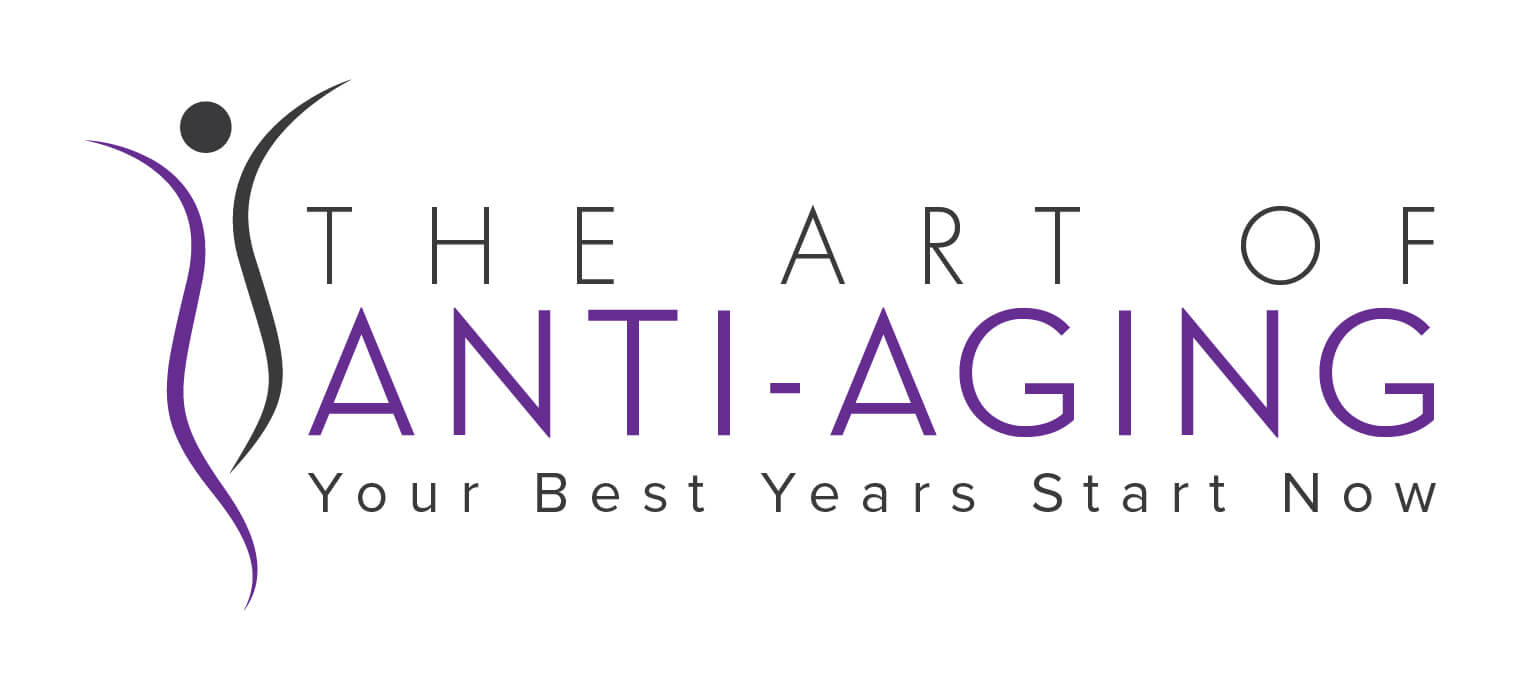
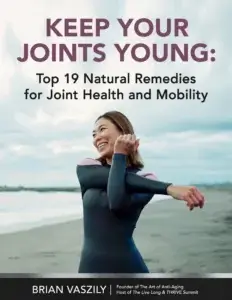
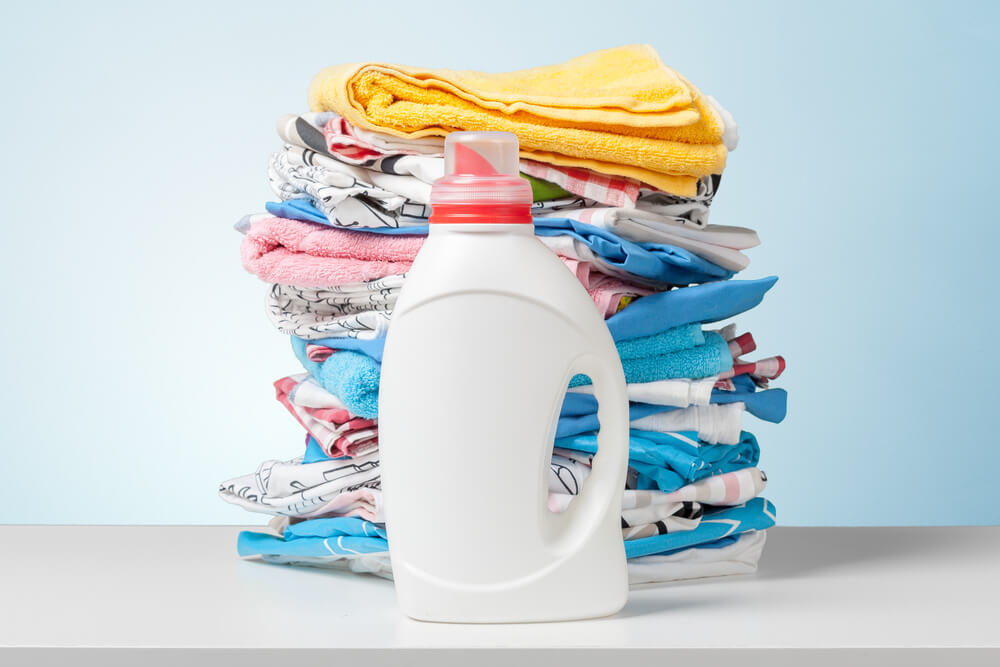
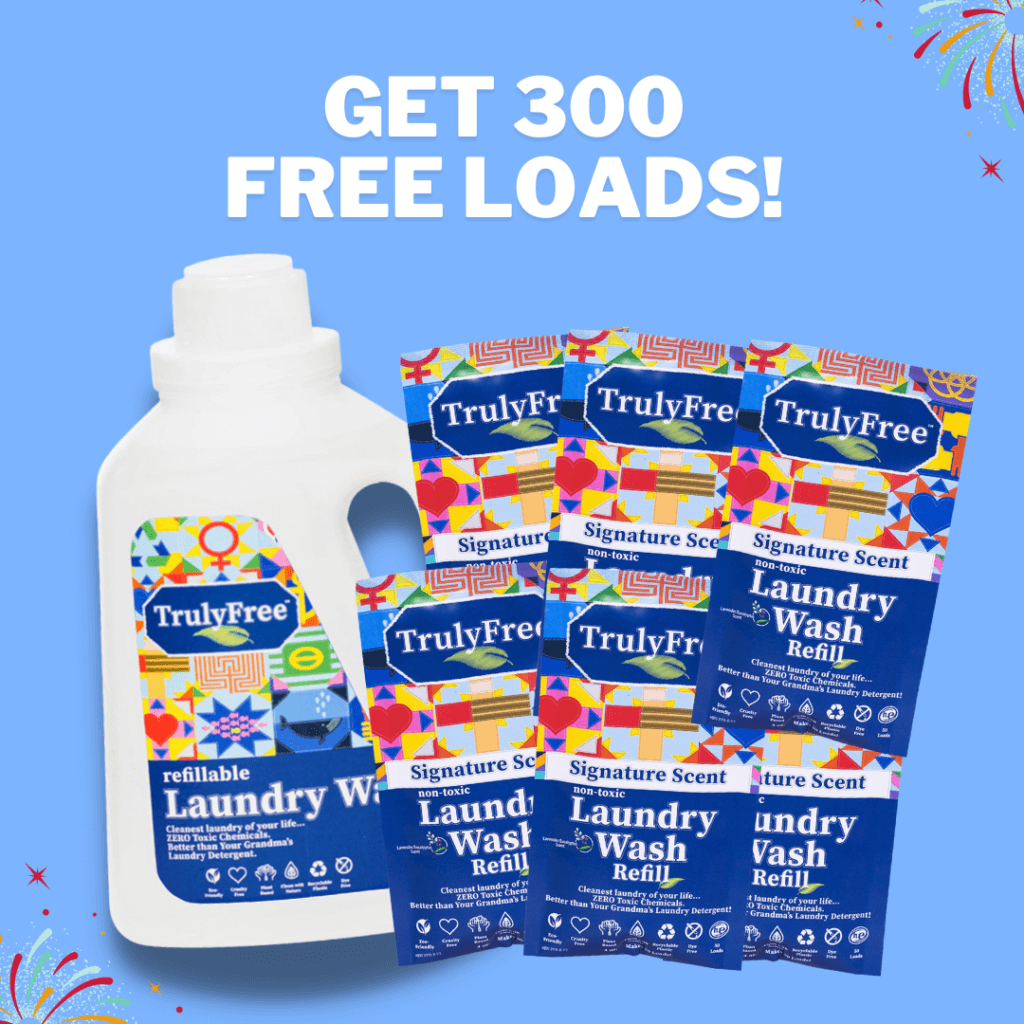
Thank you for the much needed info. I
truly will change detergents now. Your wealth and scope of knowledge is so
valuable. I appreciate you sharing!!
i could not find a fragrance free dish or laundry detergent in 3 different super markets companies in Australia
you need to get products at the health food store
Hey Norman, your comment is several months old so hopefully you’ll see this. You can make your own powdered (or liquid) laundry detergent pretty easily. Lots of recipes online. I use one that is borax powder, washing soda and grated bar soap. You can add essential oils if you like. I’ve used this for 4 years. Good luck!
Caution: Borax is highly toxic especially for animals. Even cockroaches do not like it.
Interestingly I met a ‘health’ practitioner once who was taking borax for it’s supposed benefits. Hmmmm!
Did not listen to anything else he said at that time but one never knows if he was on the cutting edge of some revised science!
Just like it took many years for conventional ‘scientists’ to acknowledge the gut biome and its influence on both physical and mental health!
P.s. I think that guy is still alive…. maybe I should check and see how he is!
Yes!! For de-tox from spending time around my heavily jabbed adult children, I use 1/8 teaspoon borax to 2 cups distilled water.
Works beautifully! Tastes like water! nothing more. The only borax mine in USA is in Cali, i believe.
Only use it once a month. Cleans ur gut biome! cleans your white tongue from parasites!
You can drink good quality water adding 1 Tablespoon lemon or lime juice. Excellent for diabetics, or anybody to clean the gut. I’m 68. Learned this at my brothers’ nursing home. Every floor had a pitcher of lemon water all day long! best wishes!
Borax is not toxic- the ingredients mentioned in the article are VERY toxic. Borax got a bad name from faulty studies. It has been used in everything from eye drops to yeast infection remedies , and yes to kill ants and cockroaches. It is an EXCELLENT alkaline water softener (meaning it makes soap work better because it binds the magnesium and calcium) and it doesn’t toxify waterways as most detergents do that have synthetic ingredients.
Use either Borax or washing soda (calcium carbonate) with natural soap as a laundry soap.
Borax also removes fluoride from water
Polly, thank you for sharing your information. It was very helpful.
That’s what I use…..a mixture of Borax, washing soda, and Fels Naptha ground up. Have been using this mixture for years.
Thanks Polly Will you give the parts per borax to bar soap to make detergent please
It’s amazing how that frebreeze has taken the country by storm. And those electrical plug and deodorizers.
Boric acid is the roach killer not borax – easy to confuse the two
bravo!
Thank you for this info. Hope Norman sees it. I will use this. =D
THANK YO
U FOR THIS INFORMATION.
Borax burns my skin and nose
I use the Green Action Laundry Liquid from Aldi. No fragrance. It doesn’t list ingredients but it’s plant-based and the closest thing to chemical free I can find.
If it has a 1-800 number on the box or container…I would call the company or maybe you can find it online. Ask them for the MSDS sheets, they have to provide you with them to show what ingredients are in their products. I would be suspicious of any product that doesn’t list ingredients or anything about their product on the back.
home made laundry detergent is easy to make IF you can find borax and the two other ingredients, In the US finding the borax is the issue: its still sold but not common, Mine comes from a home improvement store.
Norman, I bought Truly Free and it ships to your location. They have a plant base spot remover I used and soap for the dishwasher I really like. I send this to be helpful.
Nancy
Essential information in my world! As one who deeply cares about the environment we live in – both naturals world, home, and our bodies – I have been ‘sensitized’ to these kinds of choices for years. On a broader scale, when I travel internationally – I am terribly disheartened as well as having allergic reactions from the ubiquitous laundry ‘odors’ (chemical) in the air, the sheets, the wait people at restaurants – even this week in Florida I had to move to a different chair and hold my breath when the wait person cam over. Very disturbing how American companies have and are infiltrating/poisoning the world. Thank you for making this information accessible to more people.
I am quoting the following:
“Of course, you wouldn’t know this from watching advertisements for those laundry products. Those ads want to sway you into equating their products with clean, fresh-smelling clothing — they don’t want to draw any attention to what may be hiding in their formulas.
Furthermore, some companies are “greenwashing” consumers — which essentially means fooling them — by using phrases on their labels that sound health-conscious.
Unfortunately, it will require some work on your part because you can’t believe everything companies advertise.”
BECAUSE you can NO LONGER believe in manufacturer’s advertisements. MOST ALL advertisements leave out important information or are, at the least, deceptive. Some are even blatant LIARS!
I, and you ALL, should be viewing advertisements as SCAMS, since so many ARE! “Trust me, I’m telling you the truth”. (remember, I am a liar)
Hah! Good comment!
Thank you for all you do. You might also want to check out a natural laundry ball company at mysticwondersinc.com. It works great!
I just got mine and loving it so far!
Hubby got us one of these. It’s great.
It is very helpful to get so much info, Thank You. Here’s to a healthier Life!
Thank you for the detail explanation.
I use plant based call “Puracy”with written ingredients as Antunes but I will check the details to avoid any bad hidden chemicals as you described. Also will consider your recommendation for self and clients
I have been using (My Green Fills) Truly Free products for over a year now. They make excellent cleaning products for both laundry and household cleaning. I feel good about using these products because I know I’m lessening the toxic load in my body and not adding more pollution to our environment. I intend to give my daughter and daughter-in-law Truly Free products for Christmas.
Jill Giancola
Jill, thanks for sharing. I am just seeing your posting even though it was posted 10/21.
Where do you find the Truly Free products – grocery store, health food, etc.?
Your comments are very helpful. I am allergic to many things and have to be careful.
have to order them online only not in stores
Thanks for this information. can we have more details on how to source surfactants that are not dangerous to the human body?
Thanks for all the great information I get to pass on to my daughter
I cannot thank you enough for sharing with us this vital information. I wish I had not bought this big pail of detergent that I got a few weeks ago. Nevertheless, I will be very careful from now on. You are ding a great job. May you be blessed for your good work.
Hi Brian,
As an avid researcher on health, your knowledge and insights are right on! It’s disappointing to think some companies would not disclose the harmful ingredients/chemicals in their products. However, since the FDA and other government agencies do not stand up to these companies and demand stricter regulations for the benefit of mankind, this is what transpires.
My mission is to coach/consult woman on their health. When my website is up, I look forward to sharing your platforms of learning with them. Together, we CAN all make a difference! One life at a time!
Thank you for your boldness and passion to speak out for the betterment of civilization!
Best regards,
Cheryl Dirodis
thank you, Cheryl! Awesome idea! get the word out!
Teach our high schoolers going off to college, too! Most dont know not to overfill the washer, trying to save $$. Dont do it kids! My grown son does it to save time. Grrrrr! I stay on him about separating colors: light, medium, dark! Keeps clothes nicer, brighter.
Love “ZUM” online or healthfood stores. Remember, lots of suds not necessary! Americans think they need sudsy water. Has nothing to do with cleaning properly. its ok. Same for shampoo & toothpaste! Buy at vitamin stores! They have sales, too! All this keeps our water supply cleaner, our tap water!
so important if we ALL do it!
Finally! You’re the 1st person I’ve found speaking of the dangers in detergents. This is going around to my friends who will be grateful for it, I’m sure. I’ve not used detergents for washing for 2 years now. when in England I ran into an article on washing with magnets & have been using them in my washer. They too release stains & do a bang up job on my wash. Again, thanks so much for your informative article.
Hey Carol,
Any chance you can share more info about washing with magnets? That sounds interesting and I would love to find out more!
wow! what kind of magnets, please? what size? where to buy? what are they called?
Thanks a million!
Hi!!! Thank you for charring idea!!! Please explain me how work with magnets.
I would never have thought there are so many toxins in laundry detergent. I have switched to plant-based detergent. Now I really have to investigate to make sure it is what it says in the name. Thanks for this.
Hello Brian,
Thank you for the information. I am already using Truly Free for my laundry and some cleaning needs. I like them, am adjusting to the smells and everything and I am adapting to them.
The wonderfulness of it is non-toxic. That’s sets it apart. Thank you again.
Yahuah and Yahusha bless!
Hi Brian,
Your information about laundry detergent really opened my eyes. I had never even questioned the safety of laundry detergents. Such a long list of toxic chemicals! We humans and even our pets are in danger. I will definitely be changing my ways.
Also, I am a fan of yours and LOVE your Dad jokes!!!
Thank you, Brian! I feel confident that I can trust your judgement.
I have been using the scented laundry detergent for about a month now. I absolutely love it, & even noticed that my formerly white socks were actually getting white again!
This stuff is great!
Hi, this is really useful article for reducing the toxic load in our home and ourselves. The ‘clean’ scent that we get from using the proprietary washing products is a false illusion really although I must admit, it’s often a very comforting scent. However, smelling your fresh washing after using a low toxin washing liquid/powder and homemade fabric softener is so much more enjoyable. Check out using soap nuts. They’re totally ‘green’ although brown in colour and they’ll also cut the cost of buying something to wash your clothes in.
Great info; much appreciated. I believe Walmart Supercenters in NYS carry a full line of Truly Free laundry products.
Thanks for the info I will pass it on. We do live in a chemical world
If you add half a cup of white vinegar and a tablespoon of borax and bi carb soda to your wash it comes up soft and clean, hardly any need to use anything else, you can add a drop of essential oil or eucalyptus for perfumed clean clothes and sheets and it is all natural.
Thank you sooo much for sharing great information about Laundry Detergent. From now on am gonna buy the ones recommended to protect me and my family from toxins etc. Thank you and God bless you always.
I lhope they have it near me. MY dad, deceased 40some years ago, was very allergic to wash products, especially Tide. It took a while to figure it out.
I have known this for 50 years! I had an allergic reaction to the laundry detergent my mother used and thankfully our family Dr found the cause …et voila! Skin rashes gone with a natural laundry detergent! Some are not even that more expensive, but Markets like Whole Foods surely take advantage of their “audience” and jack up their prices for “natural” products.
Yes, Whole Foods is just literally evil now. We don’t go there anymore. Sad, it used to be a good place to go to!
I am very pleased with this invaluable information .
God bless you for protecting lives.
Thanks to you and all the comments made. Very interesting article, I have been looking into natural laundry detergent… Now I have a better direction
Also avoid Sodium Lauryl Sulfate in shampoos (probably about 95%). Until the early 70s, I clawed continuously at my scalp until I realized I was allergic to non-real-soap shampoos & didn’t have some bizarre psychological ailment.
Great article but i don’t think you made enough of the endocrine disrupters in laundry products, which nearly everyone is exposed to, like it or not, all the time, and which would be at the top of my list of harms from these products. Your other article on endocrine disruptors is also very good, but the fake fragrances and the air pollution from these products, wasn’t mentioned. Being the canary in the coalmine, these toxic scents have given me instant migraines for many years now, as my body sees them for what they are, poisons. I often can’t even stand next to someone who reeks of these chemicals, the scent can be smelled many many feet away from them, yet they seem to have no idea that they smell at all. These chemicals are SO persistent, as if they are attached by glue, and if someone hugs me i can’t get the smell off my own clothes and hair. Anything i buy from a thrift store requires airing in sunlight for weeks on end, and then a number of washings just to get rid of it. I recently bought a couple of used kitchen applicances (metal and glass) off ebay and not only did the packing included reek of that same awful smell (i guess it’s the dryer sheets?) but the machines THEMSELVES had somehow picked up the scent from the packaging or their previous home as if glued onto them, and it has been very difficult to get it off, even with washing and airing outside. Many new items you buy (towels, bedding etc.) comes already loaded with that obnoxious scent! My neighbour’s dryer vent pollutes my property so badly that i have to go indoors when they do their wash, usually at least once a day. I was once way up on a high hilltop overlooking a subdivision and the smell even wafted up there, and it is often wafting about the streets in towns and cities. Babies are born into this chemical environment, all their clothes and bedding, and that of their families, both kids and adults, live in this 24/7, they themselves seem to be immune to the smell, other than to think their laundry isn’t “clean and fresh” without it. And how many people do we know who have endocrine problems? How many with thyroid, weight, sleep, skin, digestion, fertility issues? I personally think laundry products, along with plastic, is very near the top of the list of chemicals we have been purposely exposed to in order to wreck our hormonal systems, which are the very basis of our health. My personal dream is that people will FINALLY wake up to all the poisoning being done to them, and i look forward to the day that i NEVER have to smell that sickening smell again………..
Summer, your comments are excellent and so helpful. Thanks for taking time to share them.
How do you keep yourself from getting exposed?
Summer, I couldn’t agree more. I’m super health conscious with everything and walking outside has become so hard on my respiratory.
The best thing I found for removing odours is hydrogen peroxide. Works awesome, even took out the fragrance of a previous laundry product, out of a sweater my sister gave me.
Dr. Bronner’s castile soap is my favorite for everything, but you need to have soft water. I use it as shampoo, body wash, hand soap, dish soap and as laundry soap for special items.
I too look forward to a clean, toxic free, natural world. 😊
Heaven will be toxic free!!💕
I am using Truly free as soon as it came out. Now they have also dishwashing LIQUID that I bought. Very good products but here the water is dirty and the water color in my toilet bowl is red.
I will try to find a LAUNDERETE WITH FILTERED WATER and wash my whites there.
Thanks for the product. As as society with toxins all around us and even in our foods and drinks, having a safe and natural cleaning solution for our laundry is so very nice., one less thing to stress about! Start detoxing your body and your environment and you’ll begin to see how many toxins are really in every part of your life. To the company.., with more customers on the way, hopefully you’ll also be able to begin to lower the price even more for all your products and further help us all continue to live in a clean and safe environment! Thank you!
Brian, your comments are helpful. Thanks for sharing them.
The more we learn the healther we can be.
Thank you. Your complete information is appreciated and needed.
How can i keep myself from getting exposed? I live in a Low Income, Multi-Family Apartment Building with one shared Laundry Room. So far I’ve had little luck with controlling the toxic soaps (detergents and fabric softeners) that the other residents are polluting themselves with. But if I so much as enter the shared laundry room at the wrong time, to say nothing of using the machines, i need to immediately go back to my apartment and remove most of my clothing and bathe myself, especially my hair, because of how polluting the fumes and gunk are to me. It’s literally SICKENING!
So my option is either waking up at 3:00 AM to get in when no one else is using , or head to the local public Cleaners at 7am, to beat rush of the other toxic patrons there.
Where is the EPA? Where and when is the Protection from these TOXIC CHEMICALS?
I refuse to use them myself, but what am I to do to protect myself from other residents who do?
Is there a detergent that is free of these chemicals sold in the UK that you know of.
Summer, your comments are exactly what I have been going through. I had a cold upper respiratory, after standing next to someone at work who reeked of these awful detergents it induced my asthma.
These chemicals come through the vents from peoples home and like you I have to come inside and bring my dog in. Raz mentioned these chemicals are like glue so true! Hugging people, passing by their home. It so weird! The smell is very ammonia like acrid and irritating. Does anyone know what that chemical might be?
I had to use a public washer/dryer while mine was down and omg! This might be an idea for those who have to use public washers. I use two washers for all my clothes. The 1st wash is hot with bleach only, people use so much detergent that there will be suds in your 1st wash. Then after wash the rest. Btw I never use driers except for big sheets.
For several years I’ve been making my own laundry soap I learned about through a piece online about homemade (and supposedly “safe”) laundry soap….using Borax, Washing Soda and Fels Naptha (ground up) but after reading about detergents on this post, I’m not sure if it is healthy. Borox has boron, sodium and oxygen; I don’t have the boxes right now for ingredients of the other two. Any ideas about the safety of this mix?
EPA Senior Chemist Lance Wallace PhD (retired) has done more laundry product research for the benefit of Us, the People, than likely anyone else. Because, throughout a decade, the US Consumer Product Safety Commission had received more complaints about fabric softeners than any other consumer product, Dr. Wallace analyzed the worst of these products. He found three pages’ worth of toxic chemicals (single-spaced!) and then highlighted for the public the neurotoxicity, teratogenicity (birth defects, miscarriages, infertility), and carcinogenicity of these substances. Others went on to test fabric softener cloths on mice. Mere inhalation of fresh air blown across a fabric softener cloth from a distance of ~3 feet caused all the mice to die within minutes. This means 1) the mice died by way of brain-cell death; which in turn means, under the same circumstances, 2) human brain cell death by inhalation. I am very surprised at the omission, in this article, of the profound findings of various commercial laundry products’ ingredients’ neurotoxicity. As the great neurologist Kaye Kilburn MD, Editor-in-Chief of the Journal *Archives of Environmental Health* would always say, “Above all, conserve the brain.”
Many thanks for the article. I am vegan and been looking for an alternative to brands sold in supermarkets etc. I am going to order from Truly.
Thanks for the information. It is an eye opener.
Have you researched the ingredients in Laundry detergent sheets / strips? I love that they take up so little storage space, are so much lighter and not messy. But is better all around, are the ingredients truly safer?
Thanks for sharing valuable information, definitely I will share it with others.
Here in Australia we have a native tree called a Soap Tree” that was used in the great depession. We take a few leaves from it and put them into a musin bag and pop it into our washing machine.
Cleans the clothes and gives them a sort of a minty fragrance.
I have been using this detergent for a couple of years. I absolutely love this product! I also love the fact that you use the container over & over -because you refill with packet & then add water to the jug so it isn’t going into the landfill.
Human-made consumer products that mass-toxify human bodies and the natural environment are ubiquitous and currently impossible to control, let alone comprehensively identify.
Knowledge and cautious awareness can help some of us avoid the worst health risks– somewhat — but the overall problem remains absent from the conscious minds of most consumers and from most manufacturers & safety regulators……..
More awareness is clearly needed, yet creating that mass awareness [Consciousness] is only possible via great effort by many more people than the present noosphere allows.
Thank you for this information! You mention polyethylene glycol is petroleum derived and we shouldn’t ingest it. But do you know polyethylene glycol is in Mirilax? This was given to me while I was bedridden in the hospital with Covid. Makes me furious! I am further infuriated with the amount of polyethylene glycol in so many “ health products “ we have today. I went into CVS and Walgreens looking for Anbesol for gum and mouth sores. I started reading labels and every product was full of polyethylene glycol. I left both stores swearing never to return. I truly appreciate the articles you share with us!!!
Great information. Thanks
thanks for the information, yes i agree with you that the laundry detergent has chemicals, and those chemicals are hurting our body.i feel the fumes go into my brains through my nostril, i know almost all things that are made to clense our clothe and homes consist of chemicals , even those to sinatize our hands, how i know, because the covid19 left me with an after effect, which the medication turn out to make me worse, but because of what i stayed with on my body, the moment i touch something that has chemical i feel my body feel big , stretch, and get more numb, that’s the reaction my body has, whe it comes in contact with chemical, and the softeners give me itch, so i use natural things to rinse my clothe like lemon squeeze in the water let the zest come out, or arm & hammer soda which give a sun smell like, while when i use to use the softner , have to put a lot of softener let the clothe smell better otherwise it smells renk
Any recipes on how to make natural or plant based laundry detergent